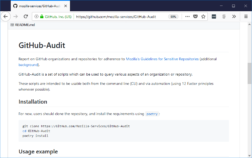At Mozilla, we’ve been working to ensure our repositories hosted on GitHub are protected from malicious modification. As the recent Gentoo incident demonstrated, such attacks are possible.
Mozilla’s original usage of GitHub was an alternative way to provide access to our source code. Similar to Gentoo, the “source of truth” repositories were maintained on our own infrastructure. While we still do utilize our own infrastructure for much of the Firefox browser code, Mozilla has many projects which exist only on GitHub. While some of those project are just experiments, others are used in production (e.g. Firefox Accounts). We need to protect such “sensitive repositories” against malicious modification, while also keeping the barrier to contribution as low as practical.
This describes the mitigations we have put in place to prevent shipping (or deploying) from a compromised repository. We are sharing both our findings and some tooling to support auditing. These add the protections with minimal disruption to common GitHub workflows.
The risk we are addressing here is the compromise of a GitHub user’s account, via mechanisms unique to GitHub. As the Gentoo and other incidents show, when a user account is compromised, any resource the user has permissions to can be affected.
Overview
GitHub is a wonderful ecosystem with many extensions, or “apps”, to make certain workflows easier. Apps obtain permission from a user to perform actions on their behalf. An app can ask for permissions including modifying or adding additional user credentials. GitHub makes these permission requests transparent, and requires the user to approve via the web interface, but not all users may be conversant with the implications of granting those permissions to an app. They also may not make the connection that approving such permissions for their personal repositories could grant the same for access to any repository across GitHub where they can make changes.
Excessive permissions can expose repositories with sensitive information to risks, without the repository admins being aware of those risks. The best a repository admin can do is detect a fraudulent modification after it has been pushed back to GitHub. Neither GitHub nor git can be configured to prevent or highlight this sort of malicious modification; external monitoring is required.
Implementation
The following are taken from our approach to addressing this concern, with Mozilla specifics removed. As much as possible, we borrow from the web’s best practices, used features of the GitHub platform, and tried to avoid adding friction to the daily developer workflows.
Organization recommendations:
- 2FA must be required for all members and collaborators.
- All users, or at least those with elevated permissions:
- Should have contact methods (email, IM) given to the org owners or repo admins. (GitHub allows Users to hide their contact info for privacy.)
- Should understand it is their responsibility to inform the org owners or repo admins if they ever suspect their account has been compromised. (E.g. laptop stolen)
Repository recommendations:
- Sensitive repositories should only be hosted in an organization that follows the recommendations above.
- Production branches should be identified and configured:
- To not allow force pushes.
- Only give commit privileges to a small set of users.
- Enforce those restrictions on admins & owners as well.
- Require all commits to be GPG signed, using keys known in advance.
Workflow recommendations:
- Deployments, releases, and other audit-worthy events, should be marked with a signed tag from a GPG key known in advance.
- Deployment and release criteria should include an audit of all signed commits and tags to ensure they are signed with the expected keys.
There are some costs to implementing these protections – especially those around the signing of commits. We have developed some internal tooling to help with auditing the configurations, and plan to add tools for auditing commits. Those tools are available in the mozilla-services/GitHub-Audit repository.
Here’s an example of using the audit tools. First we obtain a local copy of the data we’ll need for the “octo_org” organization, and then we report on each repository:
$ ./get_branch_protections.py octo_org
2018-07-06 13:52:40,584 INFO: Running as ms_octo_cat
2018-07-06 13:52:40,854 INFO: Gathering branch protection data. (calls remaining 4992).
2018-07-06 13:52:41,117 INFO: Starting on org octo_org. (calls remaining 4992).
2018-07-06 13:52:59,116 INFO: Finished gathering branch protection data (calls remaining 4947).
Now with the data cached locally, we can run as many reports as we’d like. For example, we have written one report showing which of the above recommendations are being followed:
$ ./report_branch_status.py --header octo_org.db.json
name,protected,restricted,enforcement,signed,team_used
octo_org/react-starter,True,False,False,False,False
octo_org/node-starter,False,False,False,False,False
We can see that only “octo_org/react-starter” has enabled protection against force pushes on it’s production branch. The final output is in CSV format, for easy pasting into spreadsheets.
How you can help
We are still rolling out these recommendations across our teams, and learning as we go. If you think our Repository Security recommendations are appropriate for your situation, please help us make implementation easier. Add your experience to the Tips ‘n Tricks page, or open issues on our GitHub-Audit repository.
